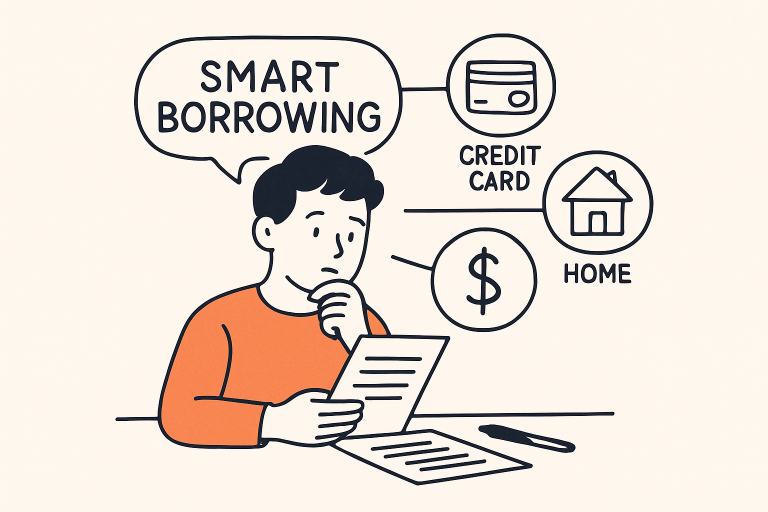Key Takeaways
- Assess your financial situation before borrowing.
- Understand different loan options and their terms.
- Maintain a good credit score to secure better loan terms.
- Develop a realistic repayment plan to avoid financial strain.
Table of Contents
- Introduction
- Assess Your Financial Health
- Understand Borrowing Options
- Maintain a Good Credit Score
- Develop a Realistic Repayment Plan
- Avoid Multiple Debts Simultaneously
- Seek Professional Advice
Introduction
Effective money management often requires borrowing, but doing so in a thoughtful, strategic manner is vital for long-term financial stability. Whether navigating surprise expenses or planning a significant purchase, taking out a loan can be helpful if handled wisely. To make the most of your borrowing options and avoid common pitfalls, it’s essential to understand the best practices for smart borrowing. For individuals looking for quick and flexible loan options that can help meet urgent financial needs, services like MaxLend offer alternative solutions. However, it’s critical to approach all lending options with clear insight and a solid plan.
This guide outlines practical strategies for borrowing responsibly, minimizing risk, protecting your credit, and staying on track toward a healthy financial future.
Assess Your Financial Health
Before applying for any loan, look closely at your current financial situation, including your monthly income, fixed and variable expenses, and any outstanding debts. This self-assessment helps you calculate your true borrowing capacity and avoid overextending yourself. Consider using budgeting tools or financial health calculators to get an objective view of your cash flow and debt-to-income ratio. Understanding your financial baseline makes it easier to determine if taking out a loan is the right move or if adjustments to spending habits might help you reach your goals faster.
Understand Borrowing Options
It’s important to familiarize yourself with the variety of lending options available so you can select the one that suits your specific needs. Common choices include:
- Personal Loans: Typically unsecured with fixed interest rates and predictable repayment schedules. These are often used for significant one-time expenses like medical bills or home improvements.
- Credit Cards: Best for small, short-term borrowing. While convenient, they often come with higher interest rates if you don’t pay the balance in full each month.
- Home Equity Loans or Lines of Credit (HELOCs): Suitable for homeowners who need larger sums and can secure the loan against their property. These often feature lower rates but come with the risk of losing your home if you cannot repay.
- Online Installment Loans: Offered by lenders such as MaxLend, these loans are accessible and can be funded quickly, but it’s essential to understand the terms, fees, and repayment conditions before proceeding. Learn more about loan comparisons.
Always read the fine print and compare total costs—including fees—not just the monthly payment amount.

Maintain a Good Credit Score
Your credit score is critical in your loan application’s outcome and the interest rates you may be offered. Lenders view higher scores as an indicator of responsible borrowing and timely repayment habits, offering better rates as a result. To maintain or improve your credit score, regularly monitor your credit report for inaccuracies, dispute any errors promptly, and make all debt payments on time. Keeping credit card balances low and avoiding late fees also contributes positively to your score. Utilize resources such as AnnualCreditReport.com to check your credit report for free every year.
Develop a Realistic Repayment Plan
Before committing to any borrowing option, such as a MaxLend loan, you must map out a realistic repayment plan tailored to your financial situation. Consider the interest rate, loan term, and any additional fees to understand the total cost fully. Adjust your budget so monthly payments fit comfortably within your income, allowing room for essential expenses and savings. To stay on track, consider setting up automatic payments, which helps avoid missed deadlines and late fees. When you apply online, having a clear repayment strategy builds financial confidence and prepares you for managing future obligations responsibly.
Avoid Multiple Debts Simultaneously
Juggling several loans at once can quickly complicate your finances and increase the chances of missed payments. Lenders may see multiple concurrent loans as a red flag, potentially lowering your credit score and making future borrowing more expensive or difficult. Focus on paying down existing debt before considering new loan obligations. Debt consolidation might be an option if you’re managing multiple high-interest loans, but always compare terms and consult an expert to ensure it benefits your overall financial health. For tips on debt management, check out this resource from the Federal Trade Commission.
Seek Professional Advice
If you feel uncertain at any stage of the borrowing process, consulting with a certified financial advisor can provide personalized insight based on your unique circumstances. An expert can help you evaluate different loan options, clarify terms, and build a tailored plan for repayment. They can also guide you through the pros and cons of consolidating debt or restructuring existing loans. The investment in professional advice can empower you to make decisions that protect both your short-term needs and long-term financial well-being.
Smart borrowing is about balance—recognizing when it helps you achieve your goals, using it responsibly, and ensuring it never jeopardizes your financial future. By applying these practical strategies, you set yourself up for responsible borrowing and long-term stability in your everyday life.
YOU MAY ALSO LIKE: FintechZoom.com Markets: Your Real-Time Financial Command Center

